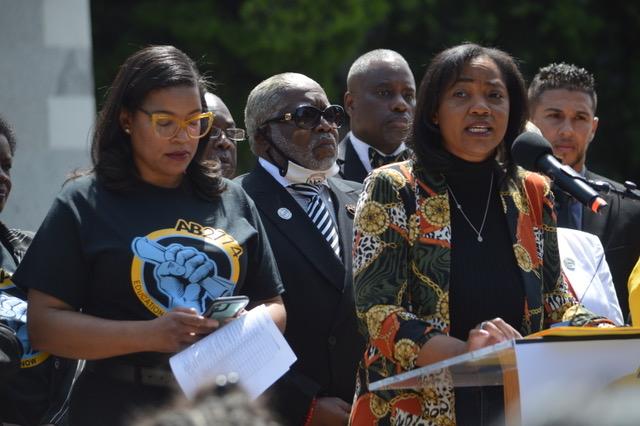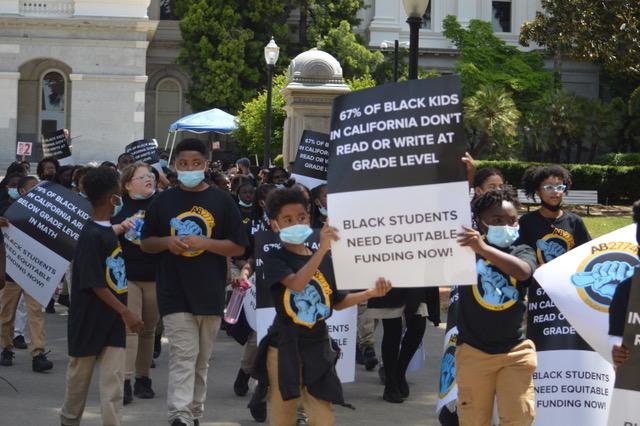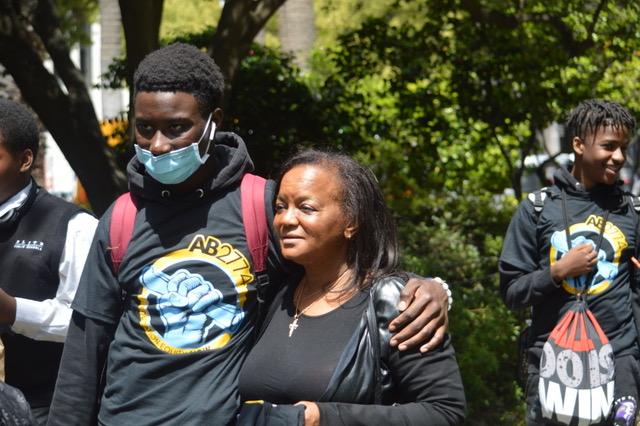Community
Bill to Increase Education Funding for Black Students Moves Forward in Assembly
Existing law provides school districts, charter schools, and County Offices of Education (COEs) with a base level of funding based on the enrollment of pupils who are either English learners, low income, or in foster care. But students that fall into more than one category are counted only once for LCFF purposes, hence the term “unduplicated pupil,” AB 2774 language explains.

By Antonio Ray Harvey, California Black Media
With a 7-0 vote, the Assembly Education Committee approved legislation that would require California’s Superintendent of Public Instruction to identify — and provide targeted funding for — the lowest-performing pupil subgroup in the state.
That sub-group is Black students.
Assemblymembers Akilah Weber (D-San Diego) and Chris Holden (D-Los Angeles), both members of the California Black Legislative Caucus (CLBC), co-authored the legislation: Assembly Bill (AB) 2774.

Students and teachers from across the state visited the State Capitol to show their support of AB 2774. CBM photo by Antonio Ray Harvey.
AB 2774 also requires school districts, charter schools, and county offices of education (COE) to be held accountable to provide additional services and improve academic performance.
Weber and Holden say they wrote the bill to remedy existing racial equity gaps and ensure that all Black students regardless of socio-economic status have the resources they need to succeed.
“This is one of our priority bills,” Weber said of the effort to enhance educational resources for Black students. “We think it is time for California to invest and focus on closing the academic achievement gap. (This bill) will add a new sub-category for the sole purpose of achieving improved test scores.”
The bill is headed to the Assembly Committee on Appropriations, chaired by Holden.
Before the vote, educators, students, and faith leaders held a rally at the State Capitol in support of AB 2774.
If approved, the legislation would provide $400 million per year in additional funding for the lowest-performing subgroup.
In 2019, testing data showed that Black students are the lowest-performing subgroup on state standardized tests with 67% not passing English Language Arts (ELA) and 79% not meeting the math standard.
The legislation, the authors say, is designed to address longstanding equity issues with the Local Control Funding Formula (LCFF), which was created to provide additional funding for the highest need students in California. The LCFF was enacted in 2013.
Supporters of AB 2774 say that over one-quarter of Black students are not receiving supplemental funding through LCFF.
“This is not the first time this bill has been introduced. It was previously introduced by my mother, Dr. Shirley Weber, who is now our Secretary of State,” Weber said. “Although we did not get everything that we wanted, our persistence will ensure this time we will get it passed. We fought hard to make sure we got this hearing.”
The language in AB 2774 states that the subgroup identified for the 2023-2024 fiscal year, based on the 2018-19 the California Assessment of Student Performance and Progress (CAASPP) scores “shall be included within the ‘unduplicated’ pupil count until its scores equal or exceeds the highest performing subgroup (Asians).”

Assemblywoman Dr. Akilah Weber speaks at an AB 2774 rally in front of the State Capitol in Sacramento before a hearing held on April 27. Margaret Fortune founder of Fortune charter school CEO standing to her right. CBM photo by Antonio Ray Harvey.
Existing law provides school districts, charter schools, and County Offices of Education (COEs) with a base level of funding based on the enrollment of pupils who are either English learners, low income, or in foster care. But students that fall into more than one category are counted only once for LCFF purposes, hence the term “unduplicated pupil,” AB 2774 language explains.
Along with Weber, other advocates for Black students attending the rally included Dr. Margaret Fortune, founder and CEO of Fortune School of Education, a network of seven charter schools in Sacramento and San Bernardino; Dr. Ramona Bishop, co-founder of Elite Public Schools, a charter school focused on technology based in Vallejo and former Superintendent for Vallejo Unified School District; the Rev. Tecoy Porter, executive director of National Action Network Sacramento; and the Rev. Jonathon Mosley, director of National Action Network Western Region.
Other attendees were Joette Spencer Campbell, NAACP San Bernardino; Tak Allen, International Faith Coalition; Dondrell Swanson, Alpha Community Education Initiative; and Bina Lefkovitz, Trustee Sacramento County Board of Education; and Tracie Stafford, chair of the Sacramento Democratic Party.
Sen. Steven Bradford (D-Gardena), chairperson of the CLBC, and Assemblymember Jim Cooper (D-Sacramento) also attended the rally.
“This is going to be a collective effort to show that we all care, and all are accountable for the achievement of Black students,” Fortune said. “This is the third time we’ve gone after this bill, and the third time with Dr. Akilah Weber it is going to be the charm.”
Activism
Oakland Post: Week of July 24 – 30, 2024
The printed Weekly Edition of the Oakland Post: Week of July 24 – 30, 2024

To enlarge your view of this issue, use the slider, magnifying glass icon or full page icon in the lower right corner of the browser window. ![]()
#NNPA BlackPress
NNPA NEWSWIRE — Reflecting on his long career, Biden expressed deep gratitude and pride. “Nowhere else on earth could a kid with a stutter from modest beginnings in Scranton and Claymont one day sit behind the Resolute Desk in the Oval Office. But here I am. That’s what makes America special,” he remarked, his voice tinged with emotion.
The post first appeared on BlackPressUSA.

Biden: Our Democracy Demands New Leadership
By Stacy M. Brown, NNPA Newswire Senior Correspondent
@StacyBrownMedia
In an impassioned address from the Oval Office, President Joe Biden laid bare his decision to step down from the 2024 presidential race, urging Americans to embrace a new generation of leadership. “Saving democracy is more important than any title. It’s time to pass the torch to younger voices,” Biden declared in an address that signaled a transformative shift in American politics.
Following his decision over the weekend to bow out of the race for re-election, Biden’s announcement was a clarion call for renewal. Stressing the moment’s urgency, Biden emphasized that the future of democracy depends on fresh, dynamic leadership. He endorsed Vice President Kamala Harris as the embodiment of this new era. “Years ago, I described myself as a transitional candidate, and now it’s time for that transition to take full effect,” Biden said, positioning Harris as the future of the Democratic Party.
While refraining from mentioning former President Donald Trump by name, Biden clarified that he views the twice impeached and 34 times convicted felon Republican presidential nominee as a fundamental threat to democratic values. “My record as president, my leadership on the global stage, and my vision for America’s future all merited a second term,” Biden stated. “But nothing can stand in the way of safeguarding our democracy. That includes personal ambition. So, I’ve decided the best path forward is to pass the torch to a new generation.”
Reflecting on his long career, Biden expressed deep gratitude and pride. “Nowhere else on earth could a kid with a stutter from modest beginnings in Scranton and Claymont one day sit behind the Resolute Desk in the Oval Office. But here I am. That’s what makes America special,” he remarked, his voice tinged with emotion.
Biden acknowledged that doubts about his ability to defeat Trump influenced his decision. “I revere this office, but I love my country more,” he said. “It’s been the honor of my life to serve as your president. But in defense of democracy, which is at stake, I think it’s more important than any title.”
Biden said he is determined to address crucial issues for the remainder of his term. His agenda includes lowering family costs, defending personal freedoms, protecting voting rights, combating cancer, addressing gun violence, and advocating for Supreme Court reform. Internationally, he said he aims to strengthen NATO, support Ukraine, and seek an end to the conflict in Gaza.
Biden’s endorsement of Harris has galvanized the Democratic Party, with Harris swiftly securing the backing of a majority of Democratic delegates. “I’m not going anywhere,” Biden reassured his campaign staff, now supporting Harris. “I’m going to be out there on the campaign trail with her, working tirelessly as both a sitting president and a campaigner.”
The landmark address, along with Biden’s anticipated speech at the Democratic National Convention, could prove pivotal in defining his legacy. “In a few months, Americans will decide the direction of our nation’s future,” Biden stated. “I have made my choice. I’ve expressed my views. Now the decision is in your hands, the hands of the American people.”
In the days before his decision, Biden confided in close advisors about his concerns regarding another run against Trump. His acknowledgment of those doubts underscored his commitment to putting the country’s needs above his ambitions. “The defense of democracy must come before all else,” he reiterated.
As Biden prepares to support Harris in her campaign, he remains focused on his presidential duties. His administration continues to push for significant legislative achievements, reinforcing his enduring commitment to the American people. “In just a few months, the American people will choose the course of America’s future,” Biden said. “The great thing about America is here, kings and dictators do not rule. The people do. History is in your hands. The power is in your hands. The idea of America lies in your hands.”
The post first appeared on BlackPressUSA.
#NNPA BlackPress
PRESS ROOM: Reparations Movement Partners Globally Mourn the Passing of U.S. Congresswoman Sheila Jackson-Lee
NNPA NEWSWIRE — we acknowledge the powerful legacy of U.S. Congresswoman Sheila Jackson-Lee. She was a steadfast leader in the fight for reparatory justice, carrying forward the legislative baton from the late U.S. Congressman John Conyers in 2018.
The post PRESS ROOM: Reparations Movement Partners Globally Mourn the Passing of U.S. Congresswoman Sheila Jackson-Lee first appeared on BlackPressUSA.

[July 22, 2024 – Chicago, IL] With an extremely heavy heart and a profound sense of loss, we acknowledge the powerful legacy of U.S. Congresswoman Sheila Jackson-Lee. She was a steadfast leader in the fight for reparatory justice, carrying forward the legislative baton from the late U.S. Congressman John Conyers in 2018. Her relentless efforts nearly brought HR 40 to passage in the House of Representatives in 2022, missing by just one vote. Her leadership was pivotal in advancing the bill out of the Judiciary Committee in April 2021 after a historic debate. Even after her diagnosis, Rep. Jackson-Lee fiercely collaborated with reparations leaders, pushing for President Biden to establish an HR40-like commission by Executive Order. She believed this executive path was crucial for addressing centuries of injustice. Despite setbacks in meetings with the President’s team, she remained optimistic and urged us to stay ready for progress.
The Earn the Black Vote Collaborative formed in 2023 in response to her urging to continue the fight for reparations. On April 25, 2024, the Collaborative released a poll showing significant support for President Biden to issue an Executive Order for Reparations. Congresswoman Jackson-Lee championed the poll’s findings, emphasizing the critical importance of reparations to African American and progressive communities. Her vision was clear: an Executive Order to create a federal reparations commission could drive transformative Black voter turnout and move the ball toward justice. She had wanted the Executive Order done by Juneteenth. Tragically, just a month after Juneteenth, she left us. We have lost a great leader for reparatory justice. In honor of her legacy, we call for the establishment of the Executive Order by President Biden. We extend our deepest condolences to Representative Jackson-Lee’s family. We call on reparation activists, leaders, and legislators globally to stand with us as we honor her legacy. May the Ancestors and the Creator receive her with joy.
About the Author:
Kamm Howard is a national and international reparations scholar and activist working for over 20 years building grassroots movements to obtain reparations for African descendants in the United States.
CONTACT:
Reparations United Phone: 773-985-2990
Email: kamm@reparationsunited.org Website: https://reparationsunited.org/
The post PRESS ROOM: Reparations Movement Partners Globally Mourn the Passing of U.S. Congresswoman Sheila Jackson-Lee first appeared on BlackPressUSA.
-

 Arts and Culture3 weeks ago
Arts and Culture3 weeks agoRooted in Tradition: The Intricate History of Black Hair Braiding
-

 Bay Area4 weeks ago
Bay Area4 weeks ago“I Will Not Be Bullied,” Says Oakland Mayor Sheng Thao
-

 Bay Area2 weeks ago
Bay Area2 weeks agoPG&E Increases Rates While Bay Area Households Are Struggling to Stay Afloat
-

 Business3 weeks ago
Business3 weeks agoGov Newsom: Raising Fast Food Minimum Wage to $20 Pays Off as Jobs Multiply in Industry
-

 Activism4 weeks ago
Activism4 weeks agoOpponents of Mayor Sheng Thao Are Calling on Her to Resign Following FBI Raid
-

 Community1 week ago
Community1 week agoHundreds Come to Jehovah’s Witnesses’ Assembly Hall for Three-Day Program of ‘Good News’ in Fremont
-

 Bay Area2 weeks ago
Bay Area2 weeks agoJuneteenth Mass Shooting Suspect Charge with Multiple Counts of Felony Assault by Alameda County DA Pamela Price
-

 Activism4 weeks ago
Activism4 weeks agoOakland Coliseum Sale to AASEG: A Model for Community Development and Inclusion


















































